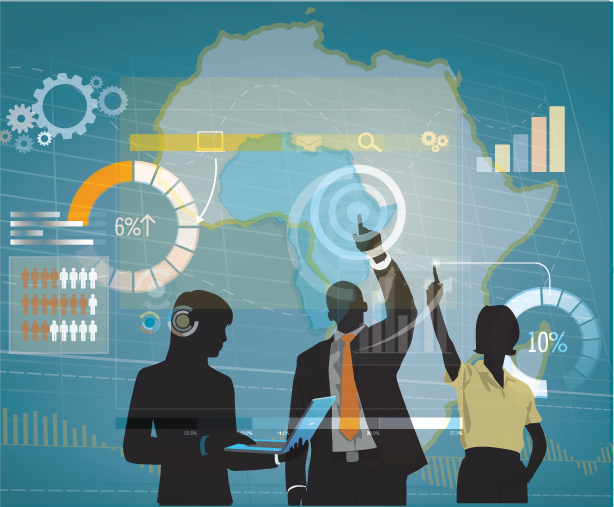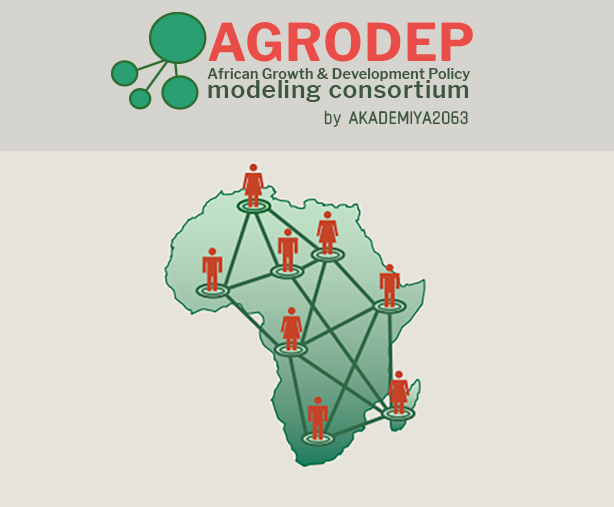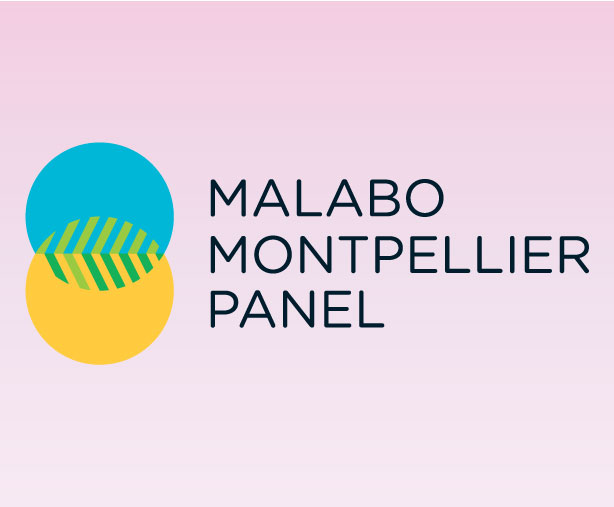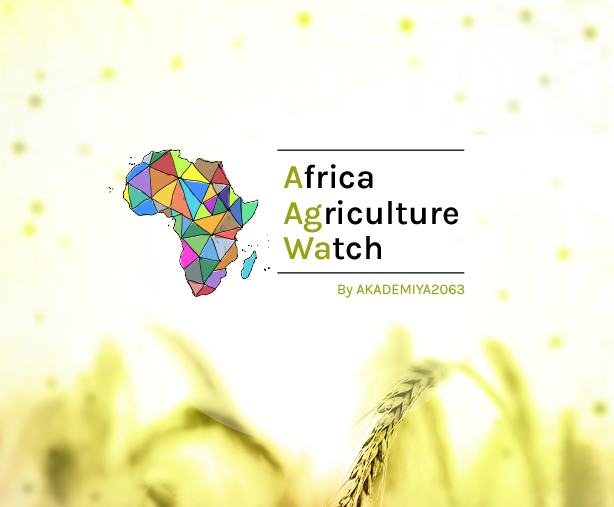OUR PROGRAMS
AKADEMIYA2063 is home to four Africa-wide core programs which offer a comprehensive and effective approach to linking data and analysis to policy design, implementation, and innovation. They include: the Regional Strategic Analysis and Knowledge Support System (ReSAKSS), the African Growth and Development Policy (AGRODEP) Modeling Consortium, the Malabo Montpellier (MaMo) Panel, and Africa Agriculture Watch (AAgWa).
Regional Strategic Analysis and Knowledge Support System
Established in 2006 under the Comprehensive Africa Agriculture Development Programme (CAADP), the Regional Strategic Analysis and Knowledge Support System (ReSAKSS) supports efforts to promote evidence- and outcome-based policy planning and implementation. In particular, ReSAKSS provides data and related analytical and knowledge products to facilitate CAADP benchmarking, review, and mutual learning processes. AKADEMIYA2063 leads the work of ReSAKSS in partnership with the African Union Commission, the African Union Development Agency-NEPAD (AUDA-NEPAD), and leading regional economic communities (RECs).
By providing policy-relevant data and analysis, facilitating dialogue among stakeholders, monitoring progress in achieving goals, and strengthening mutual accountability processes, ReSAKSS supports the successful implementation of CAADP. Key ReSAKSS activities include monitoring CAADP progress through its interactive website and the Annual Trends and Outlook Report (ATOR); enhancing Mutual Accountability in African agricultural policymaking through Joint Sector Review assessments and support to the continental Biennial Review; support to the design of evidence-based National Agriculture Investment Plans; and strengthening country-level knowledge and analysis capacities by establishing country Strategic Analysis and Knowledge Support Systems.
Monitoring CAADP progress
ReSAKSS fills critical knowledge gaps by helping African countries to assess their progress toward meeting CAADP and Malabo Declaration goals for transforming agriculture and improving livelihoods. Using innovative knowledge tools, ReSAKSS tracks progress on over 30 core CAADP indicators. The ReSAKSS website features an interactive map and chart and country and regional profiles to monitor progress across the continent by geographic region, regional economic community, economic category, and stage of CAADP implementation reached. The ReSAKSS website also features interactive country eAtlases for mapping and analyzing data at the subnational level and provides access to datasets, publications, and resources on CAADP mutual accountability processes. ReSAKSS also tracks progress on CAADP indicators through its flagship Annual Trends and Outlook Report (ATOR). Launched in 2008, the ATOR is the official CAADP monitoring and evaluation report. In addition to tracking progress on CAADP indicators, each Africa-wide ATOR delves into a topic of strategic importance to the CAADP and Malabo agendas.
Enhancing Mutual Accountability
ReSAKSS, in collaboration with country stakeholders, the AUC, NEPAD Agency, and other development partners, facilitates agriculture joint sector reviews (JSRs) that are regular, inclusive, comprehensive, and technically robust. ReSAKSS conducts assessments of country and regional JSRs to evaluate both the institutional and policy landscape and the quality of current agricultural review processes and to develop action plans for improving or establishing best-practice JSRs. Outcomes of the assessments have been used to strengthen agriculture JSR processes where they exist and establish new JSRs.
ReSAKSS also provides technical assistance to the CAADP Biennial Review Process, which reviews country, regional, and continental progress toward meeting the 2014 Malabo Declaration commitments. ReSAKSS supported the inaugural Biennial Review of 2018 as well as subsequent reviews through development of technical guidelines, tools, and indicators; training of national experts from across Africa; development of a user-friendly interface for data entry and automatic generation of scorecards; and support to efforts by countries and regional economic communities related to data collection and analysis, data entry, and drafting of country reports, regional summaries, and the continental report. ReSAKSS also supports the AUC and NPCA in drawing lessons to strengthen the review process, methodologies, and tools.
Promoting evidence-based National Agriculture Investment Plans
As many countries’ first-generation national agricultural investment plans (NAIPs) have ended, the next-generation plans must achieve the goals and targets of the 2014 Malabo Declaration. Together with local and international actors, ReSAKSS supports the development and implementation of next-generation NAIPs that are Malabo compliant through the creation of (1) a NAIP Toolbox that outlines metrics, analytical tools, methodologies, and core programmatic components to guide NAIP design; (2) a NAIP Experts Group of over 200 researchers from across Africa to provide technical support to countries; and (3) a NAIP Task Force to provide training, backstopping, and quality control for the local experts. Analytical support provided by the Experts Group includes an evaluation of each country’s current situation with respect to the Malabo thematic areas; the identification of investment priorities to increase a country’s likelihood of achieving key Malabo commitments and goals; and a qualitative assessment of good practices and indicated actions to accelerate progress under the Malabo thematic areas.
Establishing country SAKSS platforms
ReSAKSS works with national governments, including CAADP teams, to set up and strengthen Strategic Analysis and Knowledge Support Systems (SAKSS) rooted in local capacities and infrastructure. The country SAKSS is a critical instrument for supporting the review of and dialogue on CAADP implementation as well as providing country-level data and analyses.
To improve analysis and visualization of policy data, ReSAKSS has been developing country eAtlases. These are a core tools of the SAKSS platforms for mapping highly disaggregated data on agricultural, socioeconomic, and biophysical indicators in a centralized and interactive system. The eAtlases improve country data and knowledge management and help policy analysts and policy makers access and use subnational-level data to guide agricultural policy and investment decisions. In addition, with an eye to building institutional and technical capacity, ReSAKSS shares best practices for data collection and analysis; collaborates on strategic analysis with in-country partners; and organizes trainings, workshops, and conferences. For more information, visit www.resakss.org.
African Growth and Development Policy Modeling Consortium
The African Growth and Development Policy (AGRODEP) Modeling Consortium, established in 2010, is a network of Africa-based experts supported to take a leading role in addressing strategic development issues across the continent, including the analytical needs of the CAADP implementation agenda. AGRODEP facilitates the use of economic modeling tools, promotes access to data sources, provides training and research grants, and supports collaboration between African and international researchers.
The AGRODEP Modeling Consortium pursues three essential activities:
- Promote access to and use of state-of-the-art economic modeling tools to meet the demand for high-quality, locally based research.
- Facilitate access to existing data sources for research and policy analysis, improve the quality of available datasets, and identify and bridge data gaps.
- Support collaboration among leading African scientists and their peers outside Africa and build a dynamic research community that can respond to the emerging and long-term needs of the CAADP growth and poverty reduction agenda.
AGRODEP provides a shared modeling infrastructure which assembles a broad range of economic models dealing with sector, national and international policy issues; a common database platform which brings together disparate statistical, economic, and geospatial data in one central clearinghouse and develops shared standards, formats, and exchange protocols that facilitate access to high quality data; a network of experts which provides opportunities for collaboration and the exchange of data, modeling techniques, joint analysis, reporting, and strategic debate; and communities of practitioners grouped around common thematic interests to serve as a forum for scientific exchange, training, and capacity building.
In 2018, AGRODEP’s Policy Analysis and Advisory Services (PAAS) component was established to put the expertise of network members to use in providing policy advice to state and nonstate organizations that are active in development work in Africa. With the increasing recognition of AGRODEP as a major network of African experts, several members are being mobilized to use their expertise in ReSAKSS-led activities as well as projects and proposals carried out in collaboration with international organizations and universities. For more information, visit www.agrodep.org.
Malabo Montpellier Panel
The Malabo Montpellier (MaMo) Panel convenes 18 leading experts in agriculture, ecology, nutrition, and food security to encourage the development of meaningful policy innovations by African governments in order to accelerate progress toward food security and improved nutrition in Africa as part of the CAADP agenda. The Panel’s core mission is to promote and guide exchanges among high-level policymakers to encourage the scaling-up and replication of successful policies and programs from the best-performing African countries in various Malabo priority areas. The MaMo Panel is facilitated by AKADEMIYA2063 and the University of Bonn.
The MaMo Panel supports evidence-based dialogue through its technical reports that identify areas of progress and positive change across the continent as well as the institutional and policy innovations that can be replicated and scaled up in other countries. The Panel publishes two technical reports per year, with each report accompanied by around five to seven country case studies. The easily accessible and readable research reports provide expert knowledge and guidance for policy, based on careful analysis of literature, scientific evidence and practical experience on the ground.
The related Malabo Montpellier Forum (MaMo Forum) uses the evidence produced by the Panel to facilitate dialogue and exchange among high-level decision-makers on African agriculture, nutrition, and food security. Held twice per year in a different African country, the forum provides a platform for informed dialogue and exchange among African policymakers at the highest level. The Malabo Montpellier Forum convenes senior decisionmakers to assess strategies for meeting global agriculture and food security goals. Dialogue between the Panel, key stakeholders, NGOs, and the private sector promotes the sharing of high-quality research across borders. Through exchange and mutual learning among leaders in agricultural growth and food security, the biannual Malabo Montpellier Forum provides a platform to promote policy innovation using evidence produced by the Malabo Montpellier Panel. Co-Chaired by H.E. Hailemariam Dessalegn, Former Prime Minister of Ethiopia, and H.E. Assia Ben Salah Alaoui Ambassador at Large to His Majesty the King of Morocco, the Forum seeks to create a space for politicians and policymakers to exchange directly on issues of strategic importance in a context free from domestic pressures.
MaMo Panel members and staff organize and participate in national and international events and fora to discuss and disseminate findings from the Panel’s reports. In addition, Panel staff carry out extensive communication and media activities to reach out to broader constituencies, including the private sector, non-state actors, and other stakeholders involved with or interested in the broader development agenda in Africa. For more information, visit www.mamopanel.org.
Africa Agriculture Watch (AAgWa)
Launched in 2021, Africa Agriculture Watch (AAgWa) is a web-based platform that employs cutting-edge machine learning techniques and satellite remotely sensed data to predict agricultural yields and production levels of several crops across Africa to support decision-making, monitoring, crisis management, and effective intervention planning in local communities. From a digital platform that intends to contribute to reducing the data gap in the African agricultural sector, the second phase of AAgWa, as the fourth core program at AKADEMIYA2063, will lead the organization's efforts in facilitating the adoption and use of emerging technologies by African countries to achieve their development objectives, in particular, those related to the African Union's (AU) Agenda 2063 and the African Union's Digital Transformation Strategy for Africa (2020-2030).
Africa’s food production systems are constantly battling numerous threats, including climate shocks, plant disease and pest outbreaks, further exacerbated by the COVID-19 pandemic and the Ukraine crisis, among other shocks. Furthermore, the disruptions engendered by such crises require accurate and timely data generation to predict and inform agricultural production for better preparedness.
The lack of information about growing conditions can be overcome by using today’s digital technologies. For instance, remotely sensed data enables real-time tracking of changes in vegetation cover, climate data, and other parameters related to cropping activities. In addition, recent developments in machine learning and computer modeling make it possible to track and predict crop production using remotely sensed data. The weaknesses that hamper access to quality agricultural statistics can also be overcome by employing digital technologies, from measuring arable land, planted areas, crop yields to the spatial distribution of harvested quantities.
AAgWa is AKADEMIYA2063's response to the agricultural data gap, designed to harness cutting-edge predictive modeling technologies such as machine learning techniques to provide forecasts and reduce uncertainties in decision-making processes in African food production systems. For more information, visit www.aagwa.org.




